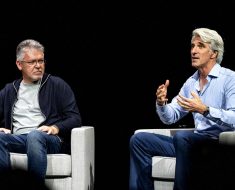While the idea of a quick-turnaround, generously AI-generated podcast might sound terrifying to some fans and creators, other players in the industry see it as an inevitability. Oskar Serrander, who describes his AI-meets-podcasting studio Wondercraft as “Canva for audio,” says that he views AI as a way to help creatives “produce at the speed of culture.” While he admits there are limits to AI, like the way the technology typically draws from past ideas rather than creating new concepts, he admires the way it might lower the barrier to entry for some brands or creators.
Serrander notes there are fewer podcast creators than there are OnlyFans creators. Meanwhile, there are millions of YouTube channels, and “then you’ve got TikTok and other social media channels and all those creators” competing for people’s attention. AI, he says, may lead to the “democratization of podcasts,” ultimately resulting in what he thinks could be a more interesting—and profitable—industry.
Granted, that’s not how those deeply invested in the art of podcasting see it. Jason Saldanha, chief operating officer of the nonprofit digital radio distribution company PRX, says that the creators he has worked with seem wary of AI, in part because they believe that “the real power of the medium is the host-audience relationship.” (Disclosure: PRX distributes podcasts for WIRED’s parent company, Condé Nast.)
While it’s certainly tempting to use AI to translate a podcast into 20 languages and just put it out into the world, it pushes the boundaries of a work’s authenticity. “The most successful podcasts have a one-to-one relationship with their audiences, like the audiences believe they’re interacting with those people in the same room or working with them to solve some problem together,” Saldanha says. Tapping an AI voice to read the news of the day or even create a brand-new tale related to the news of the day might seem tempting to those looking to make a buck podcasting, but in the long run he thinks it’s a losing game.
“The vast majority of audio companies are run by former radio executives who, in the ’90s, ran ad loads that were close to 50 percent of the content on the air,” Saldanha explains. “That created a moment where audiences were like, ‘This is too many ads. I need an alternative,’ so they went to Napster and then Spotify.”
Now that those executives are working in digital audio, Saldanha says, they’re applying the same tactics, looking to monetize podcasts to the hilt. Doing that while also adding more podcasts to the market will devalue a premium form of content, putting the entire podcast industry in danger.
“These kinds of companies are flooding the market with content to get the lowest level of engagement, and that’s fine as a strategy, but it’s not a long-term strategy,” Saldanha says. “It’s gross and it’s bad, and, ultimately, you’re cutting off your nose just to make an extra dollar.”
Caloroga Shark doesn’t see it that way. For Francis, AI should be part of a mix of tools podcast makers use to stand out in a crowded field. Listeners “will decide which shows are worthy of staying power, whether they use AI or not,” he says. Pager Protocol may or may not be in that mix.




